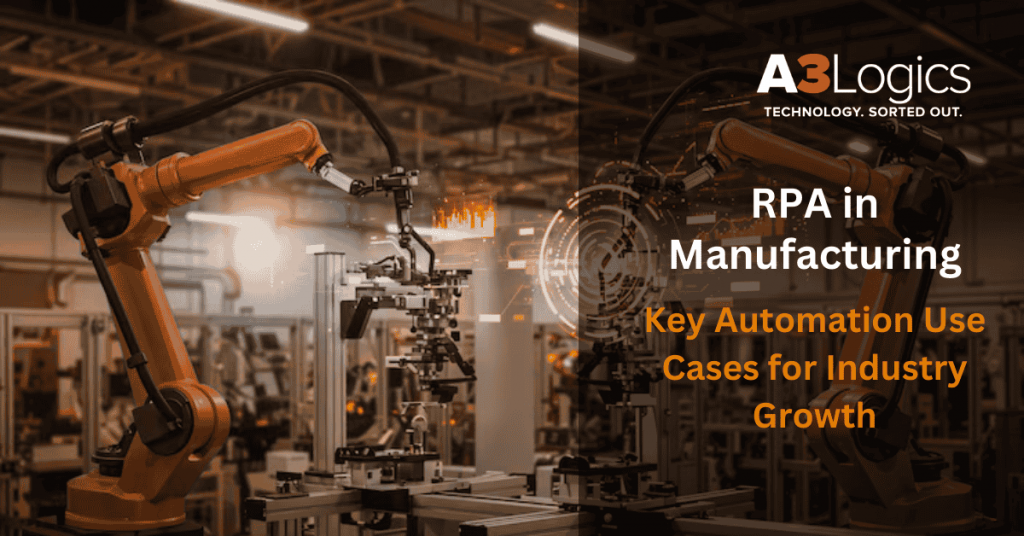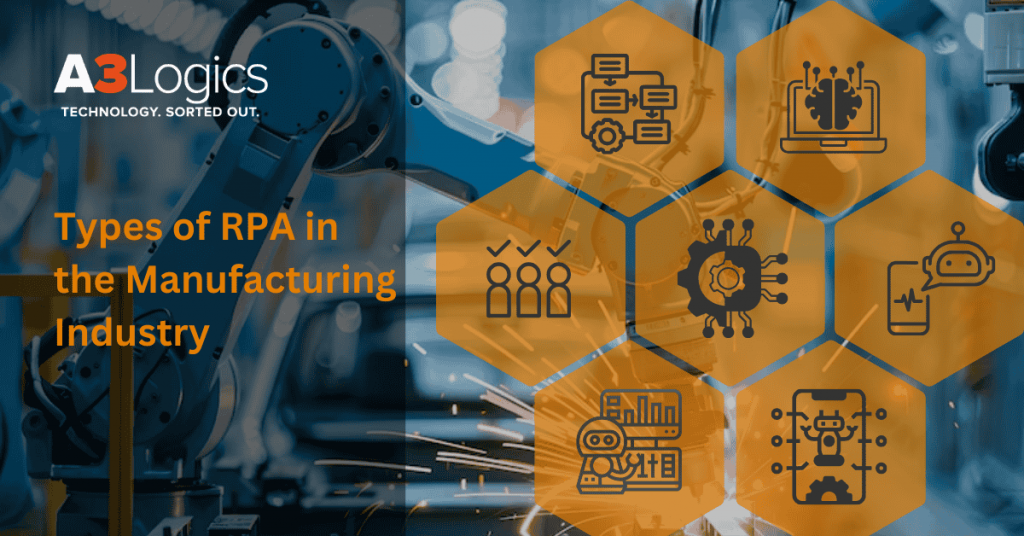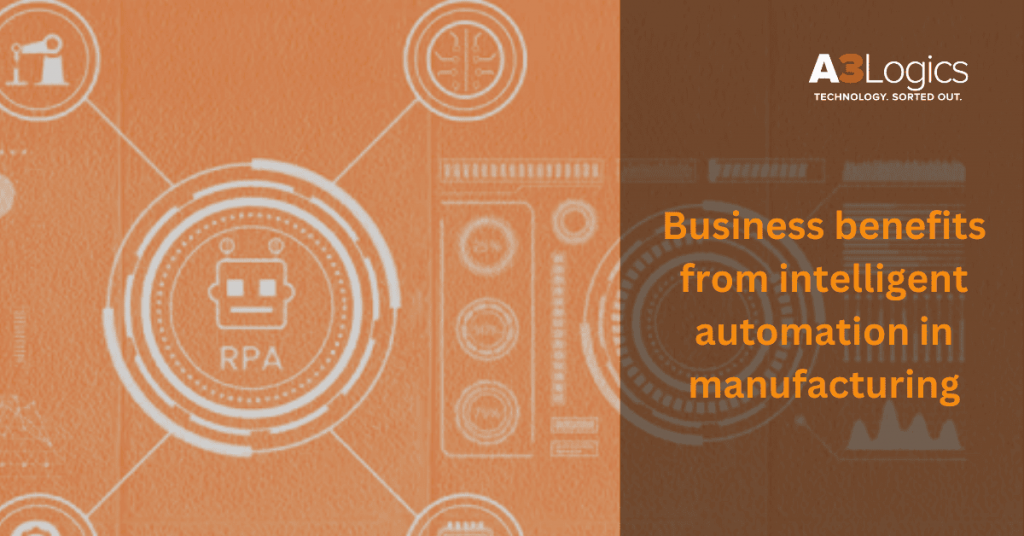Manufacturing, an industry without which no economy in the world can survive. Given the importance of the industry, we can assume that the challenges it faces are of an equal magnitude. Shortage of labor force, fluctuations in the supply chain systems, and the need for adoption of eco-friendly practices. In the past few years, the pace at which RPA in manufacturing been welcomed by a range of industries across the globe, speaks volumes about its benefits.

The use cases of robotic process automation in Manufacturing span from billing management, production line optimization, to quality control, and compliance. This is just scratching the surface, RPA goes above and beyond with the prosperity and profitability that it can bring to the manufacturing processes.
Table of Contents
Role of RPA in Manufacturing Industry: Manufacturing automation
RPA in the Manufacturing Industry plays an unrivalled role when it comes to putting things in order. It builds a frame around repetitive tasks by automating them, increasing precision, and boosting overall productivity. Its role also goes as far as fetching additional time for the human staff, which can be used to focus on more complex procedures like strategy. That being said, let’s check out the most important aspects of RPA and its role in the manufacturing domain:
1. Automation of Data Registry
RPA in manufacturing Industry plays an important role in managing information transfers that happen between CRM, ERP, and related systems.
2. Inventory Management
It automates the way inventories are taken care of through streamlining sales records, flow of the stock, and more.
3. Processing of Orders
RPA also gathers customer information from a variety of platforms and processes orders via internal frameworks.
4. Tracks Machine Usage
One of the most important features of RPA applications in manufacturing is how they can keep an eye on machines and alert users about their maintenance needs.
5. Regular Reporting
It comes in handy for creating compliance documents, maintenance analysis, and production reports that carry data from various departments.
6. Communication Management
Robotic process automation also plays a critical role in sending regular emails to vendors to confirm orders, shipment tracking, and delivery status.
7. Quality Check
It ensures that all the benchmarks for quality and compliance are being met through strict reporting procedures.
8. Bill Generation
In case of bill generation, RPA in the manufacturing industry also keeps a track of BOM logs, if and when any changes are incorporated.
9. Returns Processing and Workflow Management
RPA is also responsible for efficient management of return requests, order validation, tracking systems and claims.
10. Dynamic Scheduling
It is very swift with the constantly fluctuating orders and strategies that are based on dynamic variables like demand and supply.
11. Integrates with Legacy Frameworks
RPA gives out the best ROI when it’s coupled with legacy systems of an organisation, which helps in bringing down costs by a huge margin.
12. Gathers Customer Data
When it comes to utilising customer data for improving service delivery, there’s nothing better than RPA in the manufacturing industry.
Types of RPA in the Manufacturing Industry

One can’t speak of RPA’s significance in the manufacturing industry and not talk about its types. For each scenario and related process in the industry, there’s an RPA type that’s just built to cater to it. That being said, let’s have a quick look at the main categories of RPA that are known to be specific to the manufacturing industry:
1. Process Automation RPA
When it comes to the smart automation of everyday tasks that are monotonous in nature, RPA helps with several tasks such as order processing, data handling, and inventory management. It additionally frees up more time for employees, so that they can focus on relatively complex areas. RPA, through its process automation capabilities, saves a lot of time and also brings down the rate of errors.
2. Cognitive Automation RPA
This is the type of RPA that makes use of AI (artificial intelligence) that handle tasks that usually call for high-order thinking skills. From solving tricky problems, gathering insights from data, to understanding language – it does it all. One of the best RPA applications in manufacturing is forecasting equipment failures via quality checks. As compared to regular RPA, its cognitive counterpart can dive into complex scenarios and come up with creative solutions.
3. Attended RPA
This happens to be one of the most fascinating types of RPA. This is because it stands right beside the human staff and helps them get the work done more efficiently. Attended RPA achieves this by managing some of the processes on it own or automating them. For instance, in case of heavy documentation work, RPA can make the data entry in parallel to a human who is verifying the items. It works best for scenarios where automation is required – but with a human touch involved.
4. Unattended RPA
Unattended RPA is the one that comes into the picture when you need to get things done completely on their own, from start to finish. It’s one of the best use cases of RPA in Manufacturing Industry, as it just works things out on its own in the background, and doesn’t need human supervision of any kind. Unattended RPA is generally used in cases where a process needs to continue nonstop without any monitoring.
Read more: Attended vs. Unattended RPA
5. Hybrid RPA
This type of RPA is actually a combination of unattended and attended models. It comes in handy when there is a task that needs an equal amount of effort from both human staff and RPA. For instance, during the process of reviewing products, a human worker can spot issues and inform the bot, and RPA can then send the report ahead. It’s a model of RPA that brings more flexibility and adaptability to the table, allowing organizations more options for customization.
6. Rule-Based RPA
Rule-Based RPA is a type that needs to have preset rules before being able to carry out any task. Now, this is applicable mostly in situations where the problem can be solved via a yes or no answer. RPA in manufacturing industry uses this model to pull off tasks including record matching, sending basic notifications or alerts, and checking documents. Rule-Based RPA is not amazing at dealing with dynamic things, but it’s perfect for jobs that are repetitive in nature.
7. Robotic Control RPA
In the manufacturing industry, there are several machines and robots on the floor that need surveillance. Robotic Control RPA can step in to track their movements, regulate activity levels, and manage production units. Several sensors and systems allow these bots to interlink with the machines to oversee work efficiently. These happen to be the most important RPA models when it comes to keeping the physical processes precise and quick.
10 Use Cases of RPA in the Manufacturing Industry
We’ve already discussed the importance and types of RPA in the manufacturing domain through some of the sections above. Now, let’s dive into the top 10 use cases of RPA in Manufacturing Industry:
1. Bill of Materials (BOM) Management
Managing BOM (Bill of Materials) becomes a piece of cake, thanks to RPA’s outstanding capabilities. It can gather information from a variety of departments and updates it in a timely manner to maintain high accuracy. This helps a manufacturing unit save lots of time that is usually spent on data entry, and lower the overall rate of errors related to materials.
2. Production Line Monitoring
Another one among the top use cases of robotic process automation in manufacturing is production line manufacturing. RPA-powered bots, with the help of various sensors, compile information from machines for monitoring performance, identifying faults, and sending out notifications whenever required. It helps in reducing machinery downtime and avoiding delays, since there’s no longer any need for manual inspection.
3. Product Lifecycle Management (PLM)
From managing information related to products during their design, till the time they’re scrapped off – RPA helps throughout the PLM. It assists with record management, acts as a cross-departmental data exchange platform, and tracks all the activities involved in the life cycle of the products. This drastically reduces the human effort involved, and allows the team to sync better with each other.
4. Returns and Reverse Logistics
One of the best use cases of robotic process automation in manufacturing is returns and reverse Logistics. RPA speeds up the delivery rate of product returns through data entry on a routine basis and streamlines workflows. Moreover, it also carries out communication with the customers, uploads information, and monitors return policies.
5. Environmental and Safety Compliance
RPA-fueled bots are proactive in gathering information from a variety of channels and organizing it. If given preset instructions, they can also help an organization meet the environmental and safety guidelines issues by certified authorities. With the help of routine audits and report generation, RPA assists in lowering the overall risks associated with critical compliance benchmarks and regulations.
6. Quality Control and Defect Detection
RPA is a key contributor to the quality analysis of information that is gathered during the auditing of machines. It helps in making sure that the standards for quality are being met, and in case it doesn’t, it raises an alert. RPA in such cases doesn’t need any manual or human support, which makes it one of the most important use cases of robotic process automation in manufacturing.
7. Compliance and Reporting
RPA can also take care of monotonous tasks such as data collection for internal audit reports. From pulling information from various systems, and filling documents to generating reports – RPA covers it all. It saves a huge amount of time and helps in meeting legal standards set by several authorities.
8. Digital Twin Management
Digital Twin Management is another aspect where RPA is really useful for the manufacturing industry. It can put together data from physical machines and software databases, and upload data collected by sensors, to ensure that digital twins stay updated. This makes Manufacturing automation one of the most resourceful technologies for scheduling maintenance and improving strategic decision-making.
9. Engineering Change Orders (ECO) Management
Even when speaking of Engineering Change Orders (ECO) Management, RPA leaves no stone unturned. automation technology ensures that new changes are communicated and applied across all departments and files by sending alerts and upgrading systems. This helps an organization ensure that there are no flaws or delays in the process or product development and overall manufacturing.
10. Real-Time KPI Dashboards
Bots controlled by RPA can gather information related to how various systems are performing and prepare real-time dashboards for added convenience. Enterprise automation technology also helps managers get a concise and clear understanding of key elements such as uptime for machinery, speed of production, and level of output.
Business benefits from intelligent automation in manufacturing

From saving time and money to protecting lives of the workforce at the factory – there is no end to the benefits that RPA brings to the manufacturing industry. It goes as far as managing the process in a way that the organisation finds itself aligned with environment friendly goals. That being said let’s have a look at some of the most important benefits of RPA in manufacturing:
- Better Efficiency: Manufacturing automation helps tackle everyday tasks, brings down time taken, and increases the overall output.
- Increased Savings: RPA helps the industry save a lot of capital by controlling the investment in labour and reducing the errors.
- Boosts Quality: It makes sure that the product quality is consistent, and is achieved by information-backed procedures.
- Enhanced Decision Making: Automation technology makes use of advanced analytics and AI for tracking performance and offering useful insights.
- Maintenance Forecasting: It also forecasts maintenance aspects for machinery, decreasing overall downtime and boosting its life.
- Promotes Growth: RPA allows a business to grow in a challenging landscape without having to invest a lot in operations.
- Streamlines Supply Chain: It established cross-departmental coordination and visibility, which makes the supply chain work better.
- Reinforces workforce Safety: By handling the hazardous tasks, manufacturing automation protects the human staff from potential dangers.
- Promotes Resource Optimization: Helps in maximizing the usage of existing resources, and aligns the process with eco-friendly objectives.
Challenges of RPA in the Manufacturing Industry
Just like every other technology in the modern world, RPA too, has its downsides. Here’s a list of some of the most common challenges related to RPA in manufacturing industry:
- Legacy Framework Compatibility: Most of the manufacturing plants still use old-fashioned systems that are not compatible with the latest RPA tools.
- Huge Upfront Investment: Even though long-term savings are possible with RPA, the initial amount of investment is something that many manufacturers find difficult to manage.
- Long-term Growth Issues: It’s not like robotic process automation can’t handle growth, but each manufacturing unit has a different process, and the combination of human and machine effort, makes it tricky.
- Diversity of Work: There is a wide range of manufacturing process that call for physical labour and unforeseen scenarios which put a cap on RPA’s benefits.
- Employee Response to RPA: Existing human workforce may not respond well to modern technologies like manufacturing automation, and may fear job loss.
- Security Concerns: In cases where there may have been loopholes in security, RPA may open up a huge window for cyberthreats.
- Bot Downtime and Maintenance: Even machines may need rest sometimes, and may even breakdown because of multiple factors like sudden halt in process or lack of maintenance.
- Restricted Cognitive Skills: Automation technology is not the best with handling tasks that require complex skills like contextual understanding.
- Compliance & Regulatory Risks: Automation that’s implemented ignoring the compliance benchmarks may lead to violations that may bring hefty penalties.
- Lack of Professionals: It takes several trained RPA professionals to implement it into existing process, and these resources may happen to be rare in traditional setups.
Choosing the Best RPA Consulting Service: Key Factors to Consider
So far, we know that RPA in manufacturing is important, but what’s equally important is that you pick the right consulting services to carry out the implementation. Here are some of the top factors to consider before you finalise the technology partner for your RPA needs:
- Industry Experience: Choose a consultant who has partnered with a manufacturing sector client before and knows the industry issues inside out.
- Modern Tech Stack: Prefer working with a consulting firm that makes use of the latest RPA frameworks such as Automation Anywhere, Blue Prism, or UiPath,
- Personalized Solutions: It’s important for you to partner with a firm that can offer solutions that are customized to the needs of your business in particular.
- Training and Support: Seek an RPA development company that also provides you with post-launch assistance and wholesome training modules that your teams can use to monitor bots on their own.
- Transparent Costs: It’s always best if your RPA technology partner offers you a pricing model that is transparent to the core, and doesn’t carry any hidden costs.
- Solutions that Grow: Choose an RPA partner who has the ability and the tech stack available to support your automation growth as and when required.
- Information Security: The technology consulting firm shall follow all the updated industry guidelines and benchmarking to ensure top-grade security for your database.
- Positive Feedback History: Check out their old testimonial and case studies to know how well they’ve served other client who has similar requirements as you.
RPA in Manufacturing: Case Studies
Tight deadlines and financial restrictions often push manufacturing businesses to opt for RPA, which is a pocket-friendly and rapid channel to streamline operations. Since it’s way easier to understand and implement than other modern technologies, many organizations use it to upscale their existing processes.
One such example is the Global Lighthouse Network, a recent addition to the World Economic Forum. It leveraged RPA in manufacturing to bring down around 40% of work that wasn’t really adding any value to its processes. With the help of RPA, the organization automated several processes and turned the workflows digital, saving huge on time and money at the same time.
The current forecasts, according to sources, are putting forward a percentage as good as 36% – in the increase of CAGR growth of RPA in the coming decade.
Conclusion: RPA in the Manufacturing Industry
RPA in manufacturing is reshaping how industries manage repetitive tasks, streamline processes, and improve overall production. From inventory management to quality control and compliance reporting, RPA is driving a visible shift towards better efficiency and cost savings. By choosing the right RPA consulting services, manufacturers can ensure that automation solutions match their operational goals and long-term plans.
While there are some challenges, such as system compatibility, workforce resistance, and security risks, the advantages of implementing RPA clearly outweigh the hurdles. With the right strategy, manufacturing businesses can overcome these barriers and unlock new levels of productivity and growth. This is where partnering with an experienced AI development company can make a big difference.
Moving forward, manufacturers need to continue balancing automation with human insight. By doing so, they can fully realize the benefits of RPA consulting services, support workforce empowerment, and strengthen their position in an increasingly competitive industry.







